
Featured Blog | This community-written post highlights the best of what the game industry has to offer. Read more like it on the Game Developer Blogs or learn how to Submit Your Own Blog Post
Why You Shouldn’t Skimp on Your Game Audio: A Producer’s Perspective
Game audio is often overlooked despite the huge role it plays in user experience and the game's atmosphere. Numerous game audio pros were asked for their input on why this phenomenon persists, this producer weighs in on how to solve the problem.

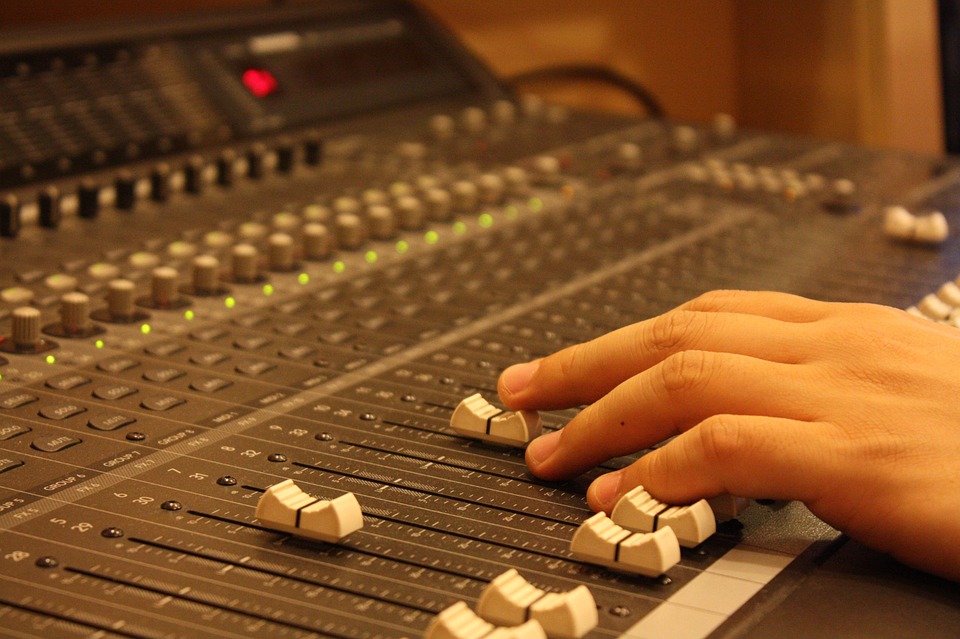
Why do game devs overlook audio so much? This is really befuddling.
Maybe I have that perspective because music is a HUGE part of my life. One of the biggest aspects of my identity is my involvement in the punk, hardcore, and metal scenes. I’ve played in punk bands, can read music, and was an orchestra geek from elementary-middle school. But I definitely wouldn’t call myself a sound professional. Don’t know mixing and dubbing. I can merge a clip or two together in Audacity and that’s basically it. I’d say my fortes as a developer are in writing, the narrative aspects of the game and penning life into the characters via dialog, designing gameplay that tends to combine things I’ve seen in multiple games that I couldn’t get enough of, as well as the business aspects of the indie dev life. My official title on all of Himalaya’s corporate documents is CFO, and while I handle those duties I’m really a designer and producer for all intents and purposes.
Ever Opened a Game Just For Its Music?
What actually made me piece this puzzle together was revisiting one of my old favorites, Heroes of Might and Magic. Paul Romero is just a freaking fantastic composer. His soundtracks flesh out the game environment so well that the pixels come to life and you feel like you’re right there: my favorite combat theme incites the adrenaline-laced tension of a druid about to aim a fireball right into your face. The Sorceress town theme totally makes me feel like I’m in some Elizabethan castle overlooking some impossibly bucolic land where unicorns frolic in wildflower-dotted leas while dwarves do woodwork if they’re not just chilling in their little cottages, and I can hop on my pet phoenix’s back and never worry about roads or the TSA.
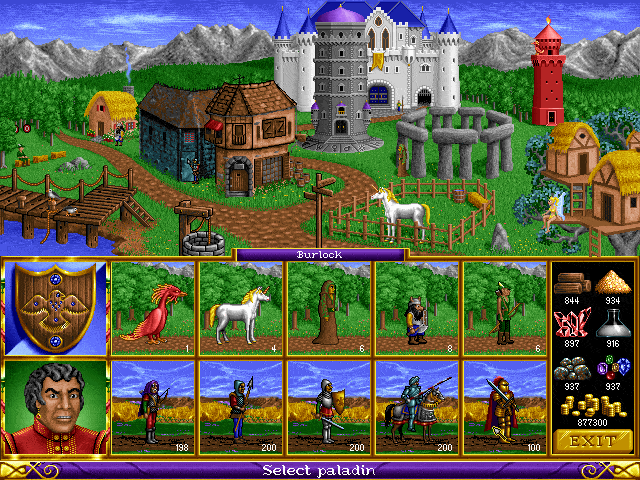
Oh yeah, I forgot the part with telling the druids to get off my lawn.
I was suddenly reminded of how back in the 90s, I got so excited that the game CD would actually play tracks just like a regular album so I could listen to those songs without having to open the game. This was before easily finding game soundtracks on Youtube, the composer’s Soundcloud page, and whatnot so it was a pretty revolutionary concept.
There were many other games where I would open them just for the music. I had a King’s Quest V saved game just for giving the Weeping Willow her heart back so I could hear the music that was on her screen, followed by the different version that played once you returned the heart. And you’d be hard-pressed to find other die-hard adventure game fans who also didn’t have save slots earmarked in Quest For Glory to just to hear the Erana’s Peace theme. One of the most popular bits of Sierra lore is that this song literally made a bigwig at a games convention cry, when the concept of even having such a convention was pretty out there.
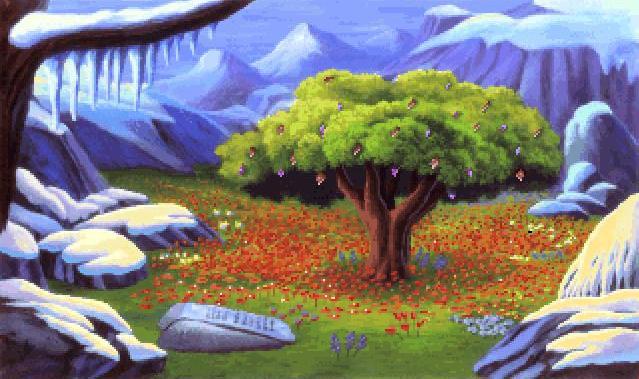 I think an entire generation of gamers is still looking for their own Erana's Peace.
I think an entire generation of gamers is still looking for their own Erana's Peace.
Audio makes up such a vast portion of a game’s atmosphere. Music influences your mood and unless you have no soul whatsoever, it literally has an effect on your body: it’s hard not to tear up during Erana’s theme. Your blood races preparing to smite those annoying gargoyles who fall like stones if they fight for you but take forever to go down if they’re on the other side. If you feel no physical effects, it’s pretty easy to at least imagine yourself being transplanted right into that game’s setting or one that your imagination kickstarts. Then things like ambient sound compound that, such as the multiple variations of chirping birds I’ve heard in all kinds of games that are all distinctive from one another. The noises that happen at random, or when your character does anything from opening a door to using a Rube Goldberg-esque grabbing device with a golfball retriever, magnet, and severed hand.
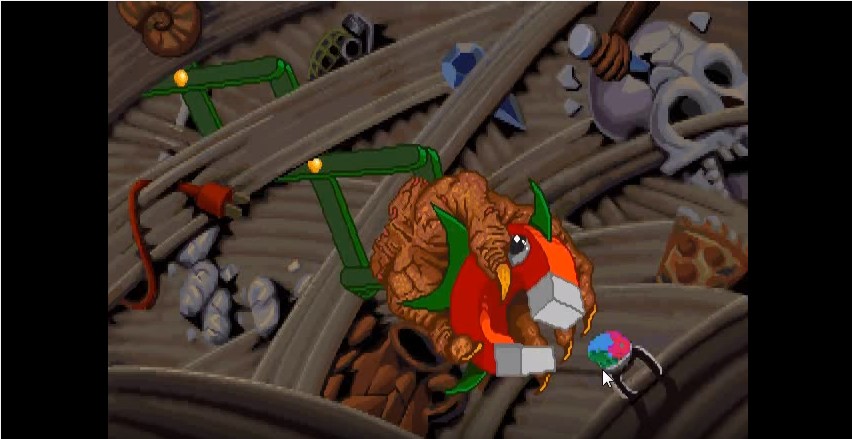
What always confused me about this puzzle was the fact that wouldn't a severed hand be too slack to really hold the magnet? Regardless, it made such a satisfying sound when you jammed it into the ball of twine!
I was merely thinking about how excited I’d be to hear my favorite songs in Heroes of Might & Magic and all the Sierra classics when it struck me that no, audio doesn’t need a Spielburgian budget to be good, but that it’s still really beyond me how so many people approach audio in such a half-assed manner when it plays such a crucial part to birthing a game’s atmosphere.
The Evocation is Gone if it’s Already Been Heard Elsewhere
Think about the leitmotifs in Zelda and Mario that even people who aren’t gamers are familiar with, and both those games’ sound effects that are synonymous of victory to most gamers. Then for adventure gamers, it would be those little dings when you got points in King’s Quest and Space Quest, all of which were unique in every game. (Quest For Glory VGA remake interestingly lacked a sound effect for getting points, which shattered my expectations given other Sierra games always having it.)
Wouldn’t it feel less special to hear the same exact sound in more than one game? A lot of indies immediately run to sound libraries, but this approach isn't always the best.
Then there’s the issue of licensed music. I always found it a curious phenomenon how it’s generally looked down upon in games, althoughFull Throttle was considered a trailblazer for heavily featuring The Gone Jackals’ Bone to Pick, which led to legions of LucasArts fans buying the album. Hey, it’s damn good music! The Cat Lady successfully executed the same concept although it didn’t make as much use of licensed songs as Full Throttle did. A cinematic game could probably pull off licensed music these days, although the royalty payments likely leave that option out of reach.
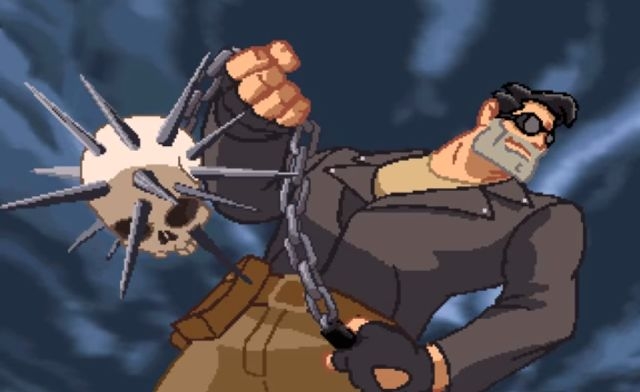 Full Throttle kicks ass for many reasons, not the least of which was the clever use of Gone Jackals samples, not just full songs, combined with original audio and ambient sound. It would be cool to do this again.
Full Throttle kicks ass for many reasons, not the least of which was the clever use of Gone Jackals samples, not just full songs, combined with original audio and ambient sound. It would be cool to do this again.
But the snubbing more or less comes from the quality decline in recycling a song that’s already been used in multiple projects, such as if you go to any given Youtube video you’ll easily find hundreds of videos with tracks provided by Incompetech. I’m not snubbing the quality of his work, merely pointing out that if you use one of his tracks in a game then people won’t open the game specially or hanker for a soundtrack. They already associate that song with something else. Moreover, they won’t specifically associate it with your work the way that Erana’s etude is associated with Sierra, how the Zelda sound effects are associated with Nintendo.
That’s not just doing a disservice to your own art, it’s poor branding too. As a designer, I want something unique that can’t be heard in any other game and makes the world I built feel alive. As a producer, I want everything to fit nicely and get done on time, and figure out what will help sell the game and get people talking about it for the love of god. On both counts, it’s definitely a bad idea to overlook audio.
Common Audio Grievances
I asked both my local audio people at Playcrafting and threw the question out on Twitter about gripes they’ve had working with, or trying to get work with, both the average bootstrapped indie developer and studios with more money and bodies behind them.
The renowned Dren McDonald of NerdTracks tweeted, “Using ‘name’ indie composers as a panacea -‘guess that’s all I need, a few songs from___& I’m done w/audio.’”
Alyssa Menes, who composed the soundtracks to Albert & Otto and Killer Queen alums’ Pixel Prison Blues, said “I tried to get a sound gig with a bigger dev once. I asked him where the audio department was and he said, ‘You mean that pile of CDs in the back?’”
Chris Rickwood, of Age of Empires fame, cited ever-problematic indie budgets. “I’ve been passed over for indie gigs because they assume they can't afford my fee.”
Lost Chocolate Lab, who’s worked on frontline titles such as Star Wars: The Force Unleashed and the acclaimed Tales of Monkey Island, chalked it up to devs simply misunderstanding the workflow aspect of audio. “Audio can’t be completed until after other disciplines, so time isn’t always allocated or respected at the end of the line, namely pre and post production.” Joel Walsh of Studio 13 concurs, stating “Devs tend to see audio as a service, that [the sound designer] can’t contribute until the game is ‘ready’.”
From the developer perspective, Nannan Yao of UGF Studio said, “Finding the particular audio is always a hassle. Generating it is even harder, because I have no idea what sounds to use or combine.”
Conclusion: combined with general indie overwhelm, overlooking game audio is primarily a workflow issue rather than one of compromising quality for price although that aspect is definitely present.
When and How Should the Sound Designer Get Involved?
In terms of workflow, it’s easy to see where an indie dev would experience system failure trying to figure out when the time is right to get a sound designer in. While it helps to look for the right person for the job sooner rather than later, you don’t want to bring a designer on when you don’t have much of a game yet. But you also don’t want to wait until the very end, when your game is ‘ready’.
In my experience, when a substantial amount of art assets are done and you can cobble a playable build together is usually the time start thinking about music and sound. Those assets are what’s going to help the sound designer figure out how to make things evocative for the player. It’s a lot harder to do that from sketches or a few screens full of placeholders.
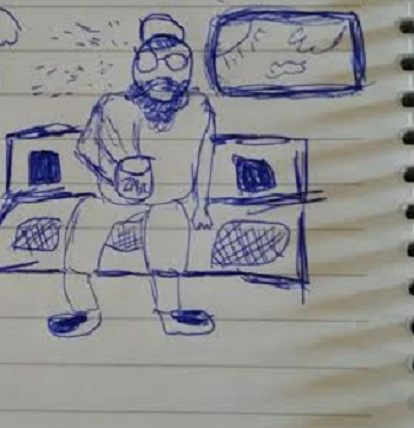
Come on, do you want your audio to be based on this? That neckbeard is going to be some awesome plumage once the artist does his thing!
Then in finding the right sound designer for your game, what kind of games have they worked on? What styles do they specialize in, and what other kinds of projects have they worked on that appeal to what’s in your game? Looking at impending projects on my plate, I’m still penning the GDD for Bombs Over Belmont which is a noir point-and-click adventure game that takes place after World War II in the Bronx. I’m thinking of a soundtrack that would be at home in a hard-boiled detective film with realistic sound effects. I’m going to pick someone with jazz experience over a composer whose forte is chiptune. That’s also a game meant to be played on a computer with real speakers to totally experience the soundtrack. Because in a complete departure from all of that, Clam Chowder Hub Run is going to be a very bright and cartoony game with a silly and light-hearted feel, and it’s a mobile game based on motion physics. It’s requires all new sound work as well as the fact that the user experience is going to be drastically different than what Himalaya games usually entail (read: people often have low or no sound playing a mobile game on their morning commute.) UX should also factor into the sound design.
Also, show your sound designer examples of music and sound effects inspiring you, much like how you’d show an artist visual references. Tell them how how many tracks and sound effects you have in mind for the game. Make lists.
Consistency and Quality = Practicality
Indies tend to flock to sound libraries as there’s a lot of free and paid pre-packaged sound for sale, all in varying quality. They were definitely not recorded in the same studio with the same equipment or made specially for one project.
Pre-packaged sound is fine for small games like prototypes, school projects, and game jams where there isn’t enough time to really think it through. Or, if you just want to make a game for no other reason than practice or showing yourself what you can do. But if you want a polished game intended to get your name out there, build up a community and brand, and get sales, then quality audio is really something you don’t want to sidestep.
Something that a player definitely doesn’t want is getting really into a game then being annoyed by clicking on something and a lot of hiss is heard, or something that is unequally coming out of one speaker which is what happens with library effects sometimes. Then if you want to layer ambiant sound with music, it may not be properly equalized to do so. Depending on your audio expertise, your time could be better spent on the design or other development aspects you simply have more strength in.
You won’t have that problem with a game audio professional designing sound effects and ambient sound, not just music, expressly for your game. It contributes to your game’s overall uniqueness and gives the player more intrinsic value, which actually factors into a nicer bottom line for you in the long run!
Conclusion
Don’t half-ass your game audio. Think of the games that influenced you and how they were such epic experiences on account of the great music they had. Don’t you want the same for your game? Get rolling once you have enough rooms completed with some real art so the sound designer can start getting a feel for the game, and let the pro do their thing with the references you give them. Then you can stand back and be proud of the epicness that has been built.
Read more about:
Featured BlogsAbout the Author
You May Also Like









